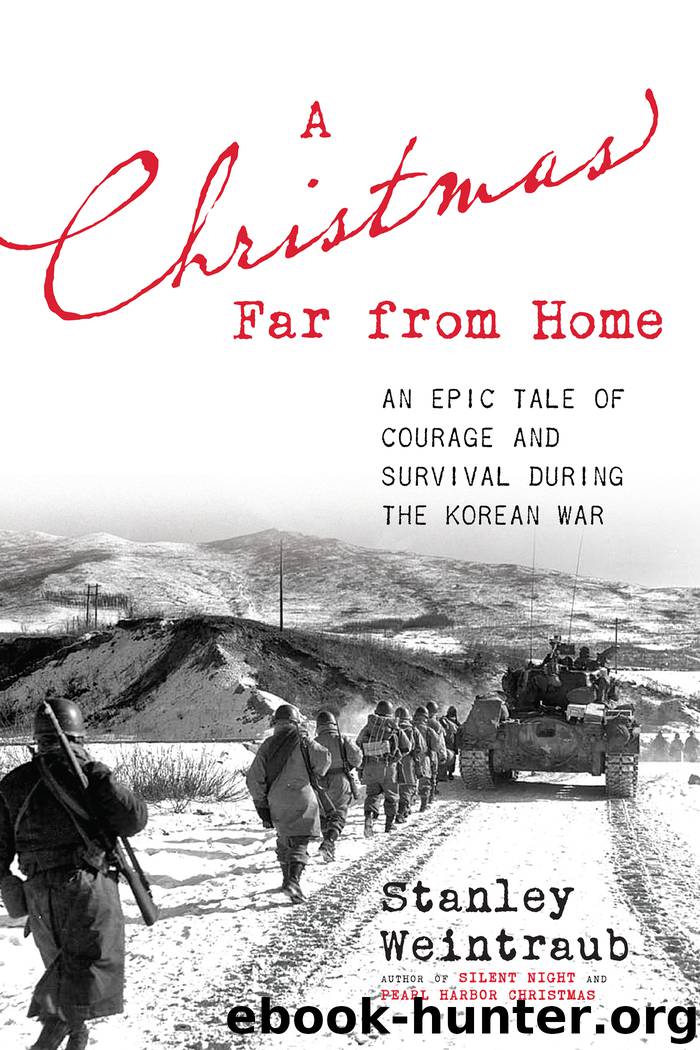A Christmas Far from Home by Stanley Weintraub

Author:Stanley Weintraub
Language: eng
Format: epub
Publisher: Da Capo Press
Published: 2014-07-29T20:33:28+00:00
Bearded and frostbitten, Bill Barber’s beleaguered Marines descending from the Toktong Pass would hold on for three days at Fox Hill. Coming down from Yudam-ni, Sergeant Aguirre of 3rd Battalion, 7th Regiment, compared the fireworks from the direction of Fox to the Fourth of July. Gravely wounded, Barber led his men with a board strapped to a leg, then while prone on a stretcher. Eighty-six men remained from Fox Company’s original 237. Only one officer, Lieutenant John Dunne of the 1st Platoon, remained unhurt. When the company withdrew from the hill as Homer Litzenberg’s 5th Marines came through, Dunne would be the effective commander, although Barber continued to shout directions.
Pushing through high drifts and frozen ridges, Davis’s 1st Battalion, 7th Marines numbered in all companies eight hundred walking wounded still carrying weapons and more than a thousand wounded and weather-disabled men in trucks and lashed to anything else on wheels. Among the uncomplaining casualties surviving in a frigid tent for two days before withdrawal on December 1 was John Yancey, who would be attended by a corpsman regularly to dig coagulated blood out of his mouth to prevent him from choking. Yancey would make it, but his Easy Company was in remnants, now combined with the diminished Dog Company. Listening to an attack nearby that was driven off without him, he “felt naked” without a rifle he could not shoulder. Exiting in the frigid gloom, Corpsman James Claypool recalled, the morale of “Dog Easy” was low. “When Yancey was with us, his people had a kind of Valhalla complex, but once he was gone, [the] death [of others] was just stark and ugly and final.”
Ray Aguirre considered the breakout downhill
the roughest battle we had ever encountered since we landed in Korea. The 5th Regiment was in front and the 7th was acting as rear echelon. They had jeeps, meat wagons,§§§ everything that could roll with one purpose, to make it out as fast as possible. How far we walked we did not know and I guess we did not care to find out as long as we could make it out alive. The Chinks had us surrounded from all sides. They had the road blocked off, so it was slow going. We would move about 200 yards and we would stop to clear the road and to fight our way forward. . . . As soon as it became dark it got worse. The gooks would try to stop us in any way possible . . . , even suicide teams, but we still would fight them off and keep going. Our casualties kept mounting up. We would put our wounded in anything that had wheels. When we did not have room anymore we would pile one [casualty] on top of the other, but we were not leaving any Marine behind. Homer Litzenberg’s 5th Marines were largely walking or immobile wounded. It meant little to them that thousands of Chinese, frozen and shot up, lay lifeless behind them, other than that they were no longer in pursuit.
Download
This site does not store any files on its server. We only index and link to content provided by other sites. Please contact the content providers to delete copyright contents if any and email us, we'll remove relevant links or contents immediately.
| Aviation | Campaigns |
| Personal Narratives |
The Radium Girls by Kate Moore(10914)
The Templars by Dan Jones(4191)
100 Deadly Skills by Clint Emerson(4084)
Rise and Kill First by Ronen Bergman(4016)
The Doomsday Machine by Daniel Ellsberg(3736)
The Rape of Nanking by Iris Chang(3518)
Killing England by Bill O'Reilly(3459)
Hitler in Los Angeles by Steven J. Ross(3442)
Stalin by Stephen Kotkin(3089)
12 Strong by Doug Stanton(3059)
Hitler's Monsters by Eric Kurlander(2735)
Darkest Hour by Anthony McCarten(2649)
Blood and Sand by Alex Von Tunzelmann(2610)
The Art of War Visualized by Jessica Hagy(2415)
Hitler's Flying Saucers: A Guide to German Flying Discs of the Second World War by Stevens Henry(2298)
The Code Book by Simon Singh(2214)
The Second World Wars by Victor Davis Hanson(2136)
Babylon's Ark by Lawrence Anthony(2073)
Tobruk by Peter Fitzsimons(2064)
